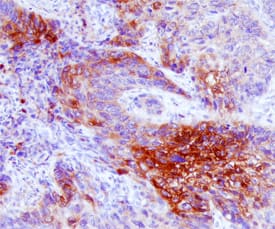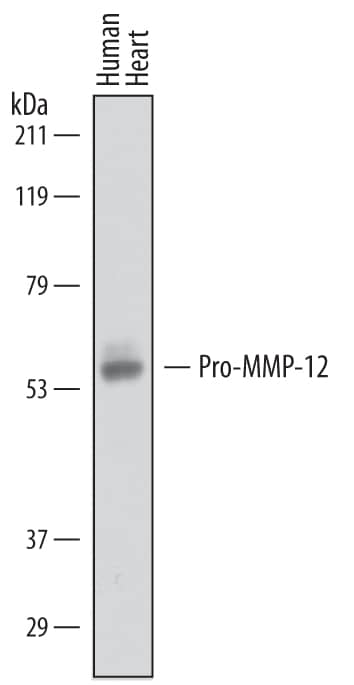Human MMP-12 Antibody
R&D Systems, part of Bio-Techne | Catalog # AF917

Key Product Details
Species Reactivity
Validated:
Cited:
Applications
Validated:
Cited:
Label
Antibody Source
Product Specifications
Immunogen
Leu17-Cys470
Accession # P39900
Specificity
Clonality
Host
Isotype
Scientific Data Images for Human MMP-12 Antibody
Detection of Human Pro‑MMP‑12 by Western Blot.
Western blot shows lysates of human heart tissue. PVDF membrane was probed with 2 µg/mL of Goat Anti-Human MMP-12 Antigen Affinity-purified Polyclonal Antibody (Catalog # AF917) followed by HRP-conjugated Anti-Goat IgG Secondary Antibody (HAF019). A specific band was detected for Pro-MMP-12 at approximately 54 kDa (as indicated). This experiment was conducted under reducing conditions and using Immunoblot Buffer Group 8.MMP‑12 in Human Squamous Cell Carcinoma.
MMP-12 was detected in immersion fixed paraffin-embedded sections of human squamous cell carcinoma using Goat Anti-Human MMP-12 Antigen Affinity-purified Polyclonal Antibody (Catalog # AF917) at 10 µg/mL overnight at 4 °C. Before incubation with the primary antibody, tissue was subjected to heat-induced epitope retrieval using Antigen Retrieval Reagent-Basic (CTS013). Tissue was stained using the Anti-Goat HRP-DAB Cell & Tissue Staining Kit (brown; CTS008) and counterstained with hematoxylin (blue). Specific staining was localized to cancer cells. View our protocol for Chromogenic IHC Staining of Paraffin-embedded Tissue Sections.Applications for Human MMP-12 Antibody
Immunohistochemistry
Sample: Immersion fixed paraffin-embedded sections of human squamous cell carcinoma
Immunoprecipitation
Sample: Conditioned cell culture medium spiked with Recombinant Human MMP‑12 (Catalog # 917‑MP), see our available Western blot detection antibodies
Western Blot
Sample: Human heart tissue
Formulation, Preparation, and Storage
Purification
Reconstitution
Formulation
Shipping
Stability & Storage
- 12 months from date of receipt, -20 to -70 °C as supplied.
- 1 month, 2 to 8 °C under sterile conditions after reconstitution.
- 6 months, -20 to -70 °C under sterile conditions after reconstitution.
Background: MMP-12
Matrix metalloproteinases (MMPs) are a family of zinc and calcium dependent endopeptidases with the combined ability to degrade all the components of the extracellular matrix. MMP-12 (macrophage elastase) is found in macrophages and its expression in monocytes can be induced by cytokines such as GM-CSF and CD40 signaling (1). In addition to elastin, MMP-12 can degrade a broad spectrum of substrates, including type IV collagen, fibronectin, laminin, vitronectin, proteoglycans, chondroitin sulfate, myelin basic protein, alpha1-antitrypsin, and plasminogen. It can also activate MMP-2 and MMP-3. MMP-12 is required for macrophage‑mediated proteolysis and matrix invasion in mice. MMP-12 is proposed to have a direct role in the pathogenesis of aortic aneurysms and in the development of pulmonary emphysema that results from chronic inhalation of cigarette smoke. Structurally, the pro MMP-12 consists of following domains: a pro domain, a catalytic domain containing the zinc-binding site, and a C-terminal hemopexin-like domain. The rhMMP-12 corresponds to the pro form that can be activated by autocatalysis under the conditions described above.
References
- S.D. Shapiro et al. (2004) in Handbook of Proteolytic Enzymes (eds. A.J. Barrett et al.) pp.540 - 544, Academic Press, San Diego.
Long Name
Alternate Names
Gene Symbol
UniProt
Additional MMP-12 Products
Product Documents for Human MMP-12 Antibody
Product Specific Notices for Human MMP-12 Antibody
For research use only

